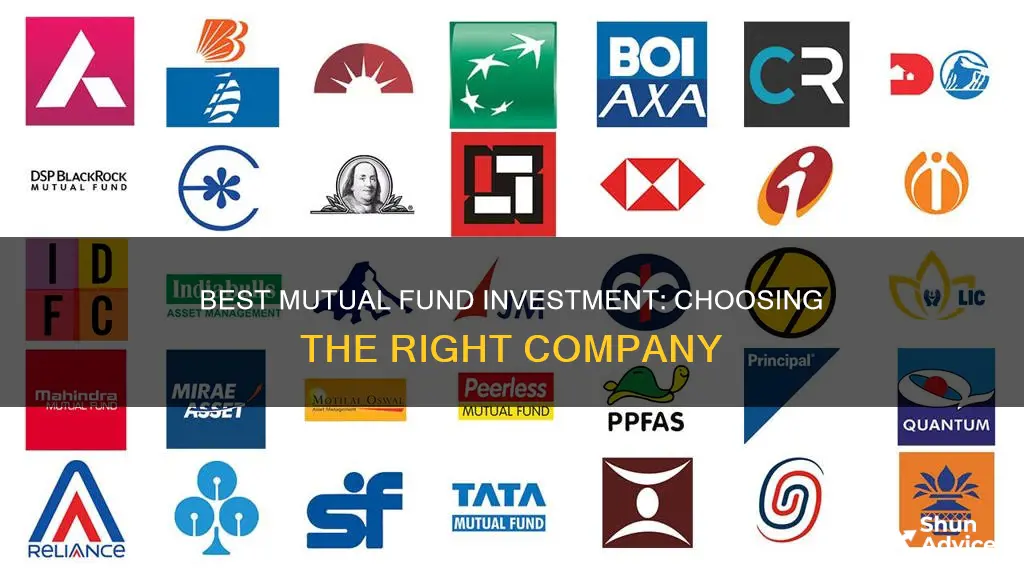
Choosing the right company for mutual fund investment is a crucial decision, as it can impact your financial goals and investment portfolio. Several factors should be considered when selecting a mutual fund company, including the company's reputation, investment options, fees, performance, and customer service. Here is an introduction to help you make an informed decision:
- Reputation and History: Look for companies with a strong industry reputation and a reliable track record in mutual fund management.
- Investment Options: Evaluate the range of mutual funds offered by the company, including the types of funds available, such as stock funds, bond funds, index funds, and sector-specific funds. Diversification is essential, so ensure the company provides access to a wide variety of funds to match your investment goals and risk tolerance.
- Fees and Expenses: Mutual funds typically charge various fees, such as expense ratios, sales loads, and transaction fees. Compare the fee structures of different companies to find the most cost-effective option. Some companies, like Charles Schwab, offer a large selection of no-load and no-transaction-fee funds.
- Performance and Track Record: Analyze the historical performance of the mutual funds offered by the company. While past performance doesn't guarantee future results, it provides insights into how the funds have fared in different market conditions.
- Customer Service and Support: Consider the level of customer service and support provided by the company. Look for companies that offer educational resources, investment tools, and responsive support to help you make informed investment decisions.
- Your Investment Goals and Risk Tolerance: Before selecting a company, clearly define your investment goals and risk tolerance. This will help you choose a company that aligns with your objectives and investment strategy.
By carefully evaluating these factors and conducting thorough research, you can make a well-informed decision about which company is best for your mutual fund investment journey. Remember to regularly monitor your investments and seek professional advice if needed to ensure your investment strategy remains aligned with your financial goals.
What You'll Learn

Mutual funds vs. individual stocks
When it comes to investing, there are several options to consider, including stocks and mutual funds. Both have their own unique features, pros, and cons, which are important to understand before making any investment decisions.
Stocks:
Stocks represent shares of ownership in a specific company, and their value is tied to the company's performance and market conditions. Investing in stocks can offer the potential for large gains if the company performs well, but it also comes with higher risk and volatility. Stocks are easy to trade through online brokers, and many brokerages do not charge trading fees for individual stocks. However, investing in stocks can be time-consuming as it requires researching and monitoring the performance of individual companies. Additionally, there is the potential for large losses if the stock price drops.
Mutual Funds:
Mutual funds, on the other hand, are investment vehicles that pool money from multiple investors to purchase a diversified portfolio of assets. They are managed by professionals, which reduces the need for individual investors to constantly monitor their investments. Mutual funds offer instant diversification, as they typically include a wide range of stocks, bonds, and other assets. This diversification helps to lower the risk compared to investing in individual stocks. Mutual funds can also be cost-effective, especially passively managed index funds, which have lower expense ratios. However, some mutual funds have high expense ratios, sales loads, and other fees that can impact investment returns.
The choice between investing in mutual funds or individual stocks depends on several factors, including an investor's goals, time horizon, and risk tolerance. Mutual funds are often considered safer and less complicated, especially for beginners, as they provide instant diversification and are managed by professionals. On the other hand, stocks offer higher potential returns but come with higher risk. For long-term retirement portfolios, mutual funds may be more suitable due to their diversification and reduced risk. For investors seeking higher returns and willing to take on more risk, individual stocks may be a better option.
In conclusion, both mutual funds and individual stocks have their advantages and disadvantages. It is important to carefully consider your investment goals, risk tolerance, and time horizon before deciding which option is best suited to your needs. Diversification is also an important factor to consider, and it is worth noting that mutual funds and stocks can be used together in a portfolio to help grow your wealth and meet your financial goals.
Mutual Fund Investment: Smart Money Moves to Make Now
You may want to see also

Mutual funds for beginners
Mutual funds are a great way to get started with investing. They are ideal for investors who don't have the time or ability to choose individual stocks and are often the first investment many people own.
Understand your goals and risk tolerance
Before investing in any fund, you must first identify your goals. Ask yourself: Is your objective long-term capital gains, or is current income more important? Will the money be used to pay for college expenses, or to fund a retirement that's decades away?
You should also consider your personal risk tolerance. Can you accept dramatic swings in portfolio value, or is a more conservative investment more suitable? Remember, risk and return are directly proportional, so you must balance your desire for returns against your ability to tolerate risk.
Decide between active and passive management
Active management involves fund managers making decisions about which securities and assets to include in the fund. Passive management, on the other hand, seeks to track and duplicate the performance of a benchmark index, and fees are generally lower.
Evaluate fund managers
The fund managers are responsible for the fund and its investments, so it's important to choose a fund with experienced managers who have performed well in the past.
Compare performance against benchmarks
When evaluating performance, look for mutual funds with favourable long-term performance that compares well against other mutual funds investing in the same area of the market. Make sure you're looking at performance against the appropriate benchmark, and not just in a vacuum.
Consider fees and expenses
Mutual funds are known for their affordability, but fees can add up and impact your returns over time. Look out for sales load, redemption fees, exchange fees, account fees, purchase fees, and annual operating expenses. The expense ratio is a good indicator of the total percentage of fund assets that are being charged in fees.
Hedge Fund Managers: Where to Find Their Investment Theses
You may want to see also

Mutual funds for retirement planning
Retirement should be a time to kick back and relax, but to get to that point, you'll need to make smart investment decisions. Mutual funds are a great way to generate a steady income stream in retirement.
When it comes to choosing the best mutual fund for retirement planning, there are a few key factors to consider. Firstly, identify your investment goals and risk tolerance. Are you prioritising long-term capital gains or current income? Are you saving for retirement, or do you need the money for something else? Do you have a high tolerance for risk, or would you prefer a more conservative approach?
It's also important to consider the fees associated with mutual funds. These can include sales fees or load fees, management expense ratios, and 12b-1 fees. Look for funds with high diversification and low fees.
- Vanguard Target Retirement 2025 Fund (VTTVX)
- Vanguard LifeStrategy Conservative Growth Fund (VSCGX)
- IShares Core Moderate Allocation ETF (AOM)
- IShares TIPS Bond ETF (TIP)
- IShares 0-3 Month Treasury Bond ETF (SGOV)
- Vanguard Wellesley Income Fund Investor Shares (VWINX)
- Vanguard Wellington Fund (VWELX)
When deciding which mutual fund to invest in, be sure to do your research and consider your own financial circumstances, risk tolerance, and time horizon.
IRA Investment Options: Mutual Funds or ETFs?
You may want to see also

Mutual funds for short-term investment
When considering mutual funds for short-term investment, it is important to understand the characteristics of a good short-term investment. These can typically be characterised by stability, liquidity, and low transaction costs.
Money market funds are a type of mutual fund that offers lower market risk and the opportunity for savings to grow. These funds invest in highly liquid, short-term debt, such as government-backed securities, and are suitable for those saving for short-term goals or building emergency savings. Vanguard, for example, offers money market funds with annual expense ratios ranging from 0.09% to 0.16%, or $9 to $16 for every $10,000 invested.
Short-term bond funds are another option for conservative investors as they are less sensitive to interest rates than portfolios with longer durations. Examples of short-term bond funds include the DFA Short-Duration Real Return Portfolio, Diamond Hill Short Dur Securitized Bd, and the DoubleLine Low Duration Bond Fund.
Additionally, cash management accounts, money market accounts, and no-penalty certificates of deposit (CDs) are also worth considering for short-term investments. These options offer liquidity, low risk, and the ability to access funds without penalties.
It is important to note that short-term investments generally offer lower potential returns than long-term investments, so setting appropriate expectations and focusing on safety rather than high returns is crucial.
ETFs and Mutual Funds: Key Investment Considerations
You may want to see also

Mutual fund fees
Mutual funds are a great way to invest in the stock market, bonds, or other types of assets without the guesswork and research involved in selecting individual investments. However, it's important to be aware of the various fees associated with mutual funds, as they can eat into your investment returns over time. Here are some of the most common types of mutual fund fees:
- Expense ratio: This is the most common fee, represented as a percentage of your investment that goes towards covering the fund's operating costs rather than generating a return. The expense ratio is usually higher for funds with active management compared to passive management.
- Sales load: This is a sales commission paid to brokers when you buy or sell shares of the fund. It can be charged as a front-end load (when you purchase shares) or a back-end load (when you sell your shares). Look for "no-load mutual funds" to avoid these fees.
- 12b-1 fees: These are fees deducted from fund assets to cover marketing and distribution expenses incurred by the fund.
- Redemption fees: This fee is charged when you sell or redeem your mutual fund shares before a certain holding period, usually within the first 60 to 90 days.
- Exchange fees: This fee is charged if you exchange shares of one mutual fund for another within the same fund family.
- Purchase fees: A fee charged when you purchase shares of a mutual fund, expressed as a percentage of the investment amount.
When investing in mutual funds, it's important to consider the impact of fees on your overall returns. Even small differences in fees can lead to significant differences in long-term returns due to compounding. For example, a 1% increase in fees on a $10,000 investment earning 10% annually can cost you more than $10,000 over 20 years. Therefore, it's crucial to compare the fees charged by different mutual funds and choose those with lower expense ratios and no or low sales loads.
Additionally, remember that you may have to pay taxes on mutual fund distributions if you hold them in a taxable brokerage account. Any capital gains or dividend income from the fund will be taxable, and you'll need to report these transactions on your tax return. However, if you hold mutual funds in a tax-advantaged account like an IRA or 401(k), you won't owe taxes until you withdraw the funds.
The Social Security Trust Fund: Where is it Invested?
You may want to see also







